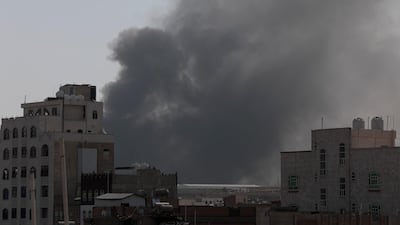US President Joe Biden's administration has made clear its desire to resolve tensions in the Middle East primarily through diplomacy. His administration faces no greater threat to this ambition than the government that sits in Iran. In its perpetual standoff with the US in the region, Tehran has, in recent days, dangerously raised the stakes.
In the past week, Saudi Arabia has intercepted more than 20 drone and missile attacks aimed at civilian targets. The attacks were claimed by the Iran-backed Houthi rebel group that rules over Sanaa. On Sunday, one targeted a petroleum plant at the Saudi port of Ras Tunara. Eighty kilometres south, another was directed at a housing complex operated by Aramco, the national oil company, in Dhahran.
No one was killed in Sunday's strikes, but the barrage has drawn comparisons with drone assaults on major oil facilities in the kingdom in September 2019. Those attacks briefly suspended over half of Saudi Arabia's oil output. At the time, many were quick to point out that this was not just an attack on the nation itself, but on the entire global energy system.
The disruption in energy markets and the impact on the price of oil as a result of Sunday's events were not nearly as severe. But they certainly highlighted once again the danger posed by the instability Iran-funded militant groups seek to foment.
Tehran's steady incorporation of the Houthis into its network of proxies in the region allows it to coordinate a targeted strategy against Washington and several Arab states across multiple fronts. It senses a US administration that is in a rush to pursue deals both to end the Yemen conflict and secure a return to the nuclear agreement signed by president Barack Obama in 2015, despite potentially high strategic costs. To exploit this, Tehran choreographs a surge of destabilising activity.
Saudi Arabia is not alone in being on the receiving end of this aggression. Iraq has recently seen a series of lethal missile attacks against its institutions, as well as targets associated with Western presence in the country. In the most recent of these, last Wednesday, a US civilian contractor was killed.
Innocent individuals have become caught up, too. Nazanin Zaghari-Ratcliffe, a British-Iranian woman, who has been held in prison in Iran on trumped-up charges since 2016, is the victim of a particularly cruel instance of hostage diplomacy. Yesterday, the long-awaited end of Ms Zaghari-Ratcliffe's five-year sentence was announced, but was followed quickly by news of a fresh court date for different charges.
As this chain of abuses grows longer, the US, in its hurry to realise preferential deals, should understand what its regional allies have been saying for a long time: that it is not dealing with a reasonable partner in Tehran. It is, rather, dealing with one that is using chaos as a tool, on whatever scale possible, to achieve its aims.



